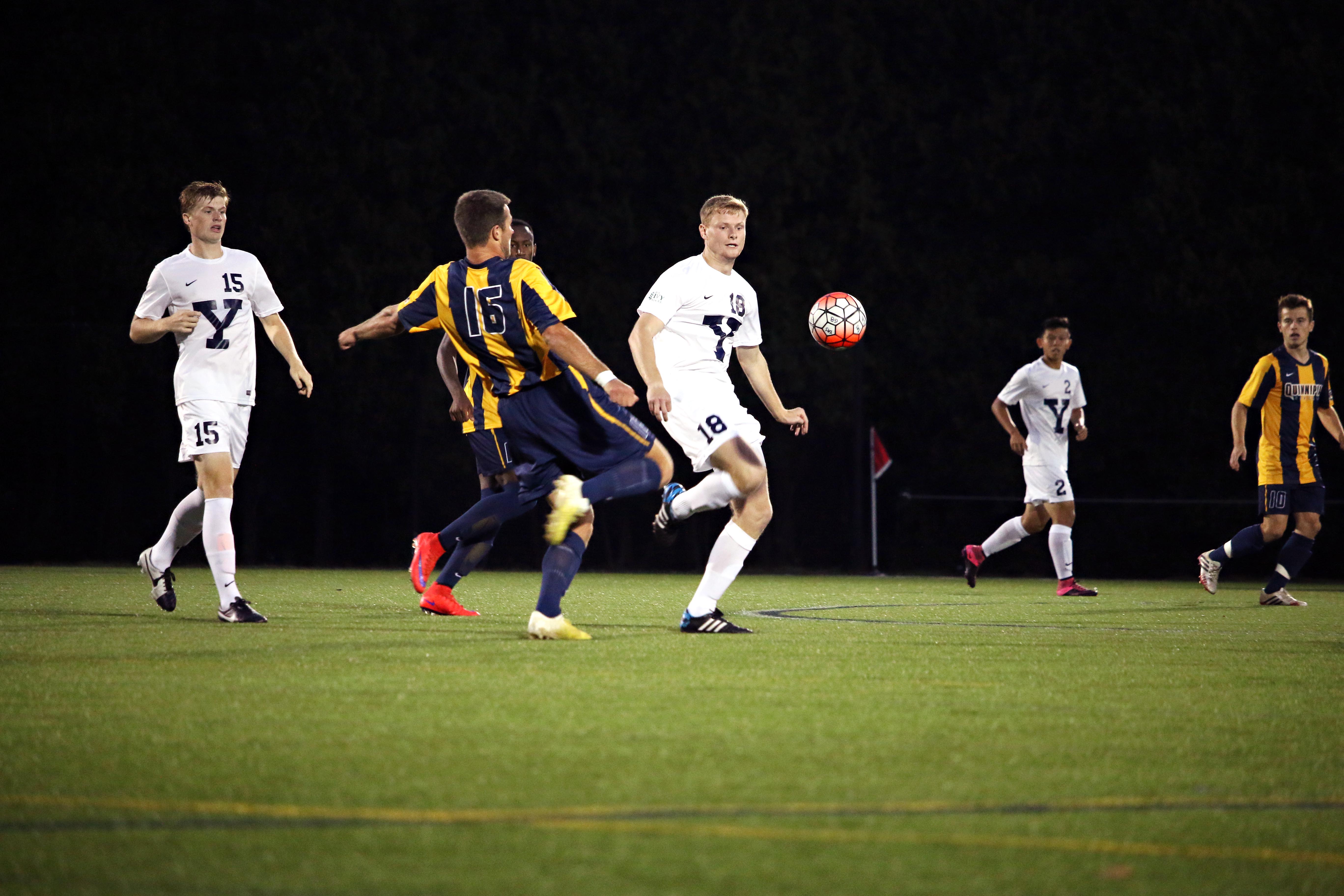
Despite a new head coach and several talented freshmen this year, the Yale men’s soccer team finished its season with a 1–14–2 record — strikingly reminiscent of last year’s 1–13–3.
The 2014 and 2015 seasons have been historic for Yale: The last time the program posted back-to-back one-win seasons was 93 years ago. The season came as a disappointment to head coach Kylie Stannard, who came in fresh off helping Michigan State University reach the NCAA Tournament quarterfinals as an associate head coach. Stannard, in addition to current and past Yale players, noted the importance of giving a new coach time to develop a program under a new philosophy, adding that the team’s final record is only one of many standards for gauging the success of a season.
“I think a lot of positive stuff still occurred this past year,” Stannard said. “Our ability to fight until the end of the game was critical to give us a chance to try to get some results.”
Stannard cited the team’s improved fitness — which has been one of his main focuses since coming to Yale — as a major contributor to the Bulldogs’ fighting spirit in the face of a one-win season. He added that the Elis were able to play hard throughout entire games, even those that went over the 90-minute mark.
Douglas Spelman ’99 — a former men’s soccer captain and a current member of the Yale Soccer Association board — highlighted the importance of a winning mentality, which he said is difficult to maintain when no players on the current roster have played for a Yale team that finished above 0.500.
He added that in all of the games he has seen since graduating, he has never seen the team’s fitness as a problem to be corrected, but that instead the issue is that the players have developed a culture of losing.
“There aren’t many ways to gain a winning mentality without winning,” goalkeeper Ryan Simpson ’17 said. “You can watch inspirational videos, have confidence in practice, even do mental imagery to see yourself compete at the level desired, but nothing replaces the emotional relief and confidence of a victory. Our mentality will change when we succeed in getting results.”
With seven one-goal losses haunting the team — including six in which the Elis held their opponents scoreless in the first half — both Stannard and midfielder Archie Kinnane ’18 noted a lack of focus late in games.
Stannard said that the defense specifically, which allowed a league-worst 2.12 goals per game in 2015, was a central issue throughout the year. This was despite the fact that defense was much more of a focus for Stannard upon arriving in New Haven than it was for previous head coach Brian Tompkins, according to Simpson.
“In [Tompkins’] practices, we didn’t focus particularly on one side of the ball or another, just simply played,” Simpson said. “With Coach Stannard, our efforts were much more defensive-oriented, reflected in games by our strength defensively in terms of team shape and also potentially showing some of our disconnect in transitioning into the attacking third.”
Spelman, who was in his second season at Yale when Tompkins began his 19-year tenure, noted the crucial role a new coach can play in turning around a team. When Tompkins came to Yale in 1996, his program improved from a seventh-place finish in the Ivy League in 1995 to second place the next year.
Although Stannard came from a Big 10 school, he does not believe that the different climate in the Ivy League — including more academic demands on athletes, he said — had a significant impact on the season’s result.
He explained that while Yale and Michigan State play entirely different opponents, there is not a large difference from the standpoint of competitiveness between teams.
“At every level in Division I, there is no easy game,” Stannard said. “That is the same whether it is Michigan State or Yale or the ACC or whatever it is.”
Director of Athletics Tom Beckett said in an email to the News that the goals and objectives for each athletic program are defined at the start of each year. He added that at the end of each season a review of all aspects of the program is conducted — none of which can be shared with the public, Beckett said.
Senior Associate Athletic Director Jeremy Makins, the administrator in charge of Yale soccer, did not provide any additional information but said that the Yale athletics administration supports Stannard in any goals he has a coach.
The Bulldogs’ poor performance in the last two years has also not seemed to affect the recruitment process, Stannard said. He said that because Yale has such “an incredible brand name” both nationally and internationally, the recruits who had already verbally committed to the program earlier this year have not changed their stance.
“We’re getting interests, but we have to start being able to compete against those high academic schools that we compete with, even outside the Ivy League, like Duke, Notre Dame and Stanford,” Stannard said. “But believe it or not, we’re actually getting kids that have been in conversation with some of those places.”
As of Nov. 18, Yale has five players verbally committed for the class of 2020, according to TopDrawerSoccer.com, a website that provides statistics for both high-school and college level soccer.
Nine months before Stannard’s new recruits come to campus, former player Charles Paris ’12 said he is confident in the program’s ability to turn itself around.
“This season was not great, last season was not great,” Paris said. “I would love to see more wins, but I think it’s coming. I hope it’s coming.”
In addition to Stannard, Yale brought in two other new head coaches this fall: women’s basketball head coach Allison Guth and women’s lacrosse head coach Erica LaGrow.







